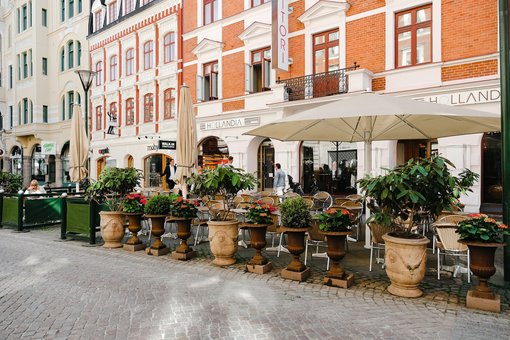How Much Does It Cost to Study in Sweden?
Sweden

The living costs for international students in Sweden can be expensive compared to other cheaper European countries. Before beginning their studies in Sweden, international students usually plan their financial costs way ahead and plan on how to afford to study abroad in Sweden.
However, there are plenty of ways to save money and spend less on living expenses as an international student in Sweden. The average living cost of studying abroad in Sweden is around €1,000, not including tuition fees.
What is the Cost of Studying in Sweden?
The tuition fees in Swedish universities always vary depending on the student's nationality. As usual, Non-EU students pay more in tuition fees compared to students from European countries.
However, Sweden stands out regarding tuition fees for European students since all undergraduate and postgraduate degrees are free. Furthermore, Ph.D. studies are free for all students, domestic and international.
On the other hand, bachelor's and master’s degrees in Sweden are not free for international students. The average tuition fees for all degree studies range from €7,500 - €25,000 per year, depending on the degree level, program, university type, and location.
What Are the Tuition Fees for Undergraduate Students in Sweden?
The tuition fees for bachelor's degree programs in Sweden vary depending on the course and university. The average tuition fee for undergraduate studies in Sweden is around €11,800 per year. However, some degree programs may be more expensive than others.
Here is a list of Sweden's most popular degree programs and their tuition fees:
- Social Science and Humanities: ~ €9,700 - €10,000.
- Architecture and Design: ~ €17,400 - €27,000.
- Science: ~ €15,000.
What Are the Tuition Fees for Postgraduate Students in Sweden?
Each university in Sweden has the right to set its own cost of tuition for international students.
As such, students must check the chosen university’s website to understand what each course or degree program costs. The average tuition fees for master’s degree studies in Sweden can range from €8,000 - €30,000 per year, depending on the university.
However, similar to undergraduate studies, some study fields in Sweden’s postgraduate degree programs tend to be higher. Some of the master’s degree programs that are considered expensive include Medicine, Architecture and Design, and Art degrees.
Furthermore, most universities in Sweden require master's degree candidates to pay an application fee of €90 - €100 for almost all degree programs, in addition to the fixed tuition fees.
What Are the Tuition Fees in Public and Private Universities?
Overall the tuition fees in public universities in Sweden are cheaper than in private universities. Also, aside from the tuition fees, most universities require applicants to pay registration fees before starting their studies.
Public universities in Sweden require only international students from Non-EU countries to pay tuition fees, unlike EU students who are exempt from paying tuition fees in Swedish universities.
Tuition Fees at Public Universities
The average tuition fees for bachelor's degree programs in Sweden range from €8,000 - €15,000 per year, depending on the course and study field. On the other hand, tuition fees for master's degree programs range from €8,000 - €23,000 per year.
Here are some of the most popular specializations and their tuition fees at public universities:
Economics and Management:
- Bachelor Degrees: €8,000 - €12,000 per year.
- Master Degrees: €12,500 - €14,000 per year.
Engineering:
- Bachelor Degrees: €8,000 - €12,000 per year.
- Master Degrees: €12,500 - €14,000 per year.
International students who plan to study at the doctoral level in public universities in Sweden do not have to pay any tuition fees since it is free for all students.
Tuition Fees at Private Universities
As previously mentioned, private universities in Sweden are more expensive than public universities. However, the tuition fees also depend on the study field and degree level. The average tuition fees at private universities for international students —regardless of degree level— range from €8,000 to €23,000 per year.
Here are some of the most popular specializations and their tuition fees at private universities:
Economics and Management:
- Bachelor Degrees: €8,000 - €12,000 per year.
- Master Degrees: €8,000 - €12,000 per year.
Engineering:
- Bachelor Degrees: €12,500 - €14,000 per year.
- Master Degrees: €12,500 - €14,000 per year.
Similar to public universities, Ph.D. studies are mostly free in private universities as well, for all students, including international students.
What Are the Living Expenses for Students in Sweden?
The living costs for international students in Sweden are typically more expensive than in any other European country. However, if you learn to save money and live a modest lifestyle, you can still live a comfortable student life in Sweden by not going out and cooking. That said, the average student in Sweden spends around €800 - €1,200 per month.
The average monthly cost of living still depends on many factors, such as the university city, accommodation rent and location, and how much you spend on food and other essential expenses.
The main factor of the living expenses of an international student in Sweden is the city, and here are the monthly expenses depending on the city you are living in:
| City | Accommodation | Eating Out | Transportation | Overall Living Costs |
|---|---|---|---|---|
| Gothenburg | €320 - €450 | €7 - €14 / meal | €33 - €35 | ~€1,250 |
| Lund | €260 - €450 | €10 - €18 / meal | €50 | ~€850 |
| Stockholm | €320 - €640 | €9 - €18 / meal | €45 - €50 | ~€1,300 |
How Much Do Students Spend on Everyday Expenses in Sweden?
As an international student studying abroad, Sweden comes with many other essential expenses. Aside from the tuition fee and the accommodation rent, the average monthly living cost of around €1,000 includes numerous other expenses that international students cannot avoid.
Here is a more detailed explanation of how much international students spend in Sweden:
- Transportation. Most students and adults in Sweden use public transport as the most common mode of transportation. The average ticket for public transport costs around €40 - €55 per month. However, a large percentage of students rent bikes to get around for around €120 per month.
- Food and groceries. Students usually spend the most money on eating and drinking in restaurants. If you are not careful enough, you can easily spend all your money on these activities, considering Sweden is an expensive country. However, the average student spends around €200 per month on groceries. The cost can easily reach €300 per month if you order takeout food. Some of the most affordable supermarkets include Lidl, Willy’s, and supermarkets in the suburbs.
- Utilities. Most rented accommodations usually include internet, which is affordable for international students. If the rent includes electricity and water, students may pay around €120 per month on other utilities that are not included in the rent.
- University textbooks. Students in Sweden spend around €70 - €100 per month on textbooks, depending on the study program. However, many alumni organizations offer students second-hand university materials for a lower price or even free.
- Health insurance. Health insurance is essential for international students studying in Sweden, and they usually pay around €30 per month or more, depending on their nationality.
- Student discount. International students in Sweden can purchase a student discount card of around €5 - €33 per semester, depending on the university. This card allows them to use any student-related activities and other off-campus discounts. Students in Sweden can also get discounts in shopping stores, gyms, restaurants, and other entertainment by purchasing national student cards such as Mecenat or Studentkortet.
How to Save Money as an International Student in Sweden?
Although Sweden is considered an expensive country, international students can always find ways to reduce their living expenses by saving money on entertainment and other ways, which are elaborated below.
Here are a few tips to keep in mind if you want to save money when studying in Sweden:
- Check location. When deciding to study abroad in Sweden, it is important to check the average living costs for students in the city where the university is located. As such, be careful to choose a university located in a city you can afford to live in.
- Use student discounts. If you wish to save more money while studying abroad in Sweden, consider the many student discount options. Some of the most popular international student discount cards include ISE, ISIC, and the StuCard, which can include a certain number of countries and certain activities.
- Part-time jobs. One of the easiest ways to save money or make more money as a student is by working part-time jobs. Since international students are not allowed to work full-time and have classes to attend for half of the day, you can use your free time to work part-time, depending on your schedule.


